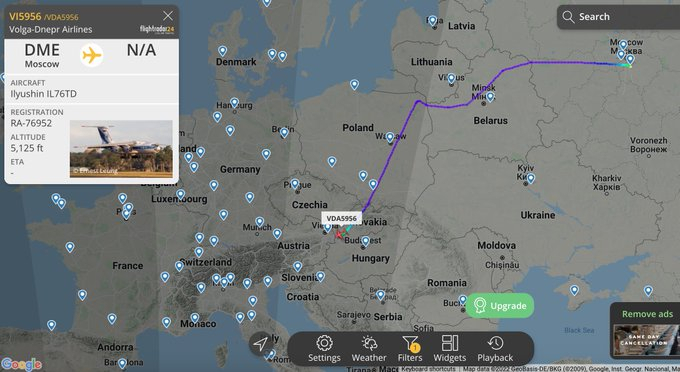A Russian aircraft raised questions after appearing in the prohibited EU airspace on Tuesday before landing in Slovakia. People wondered why was the Russian cargo plane Il-76TD VI5956 allowed to enter the EU airspace, which has banned Russian aircraft, let alone land in Slovakia's capital Bratislava. Slovakia has also prohibited its airspace for Russian flights.
The Russian cargo plane, operated by the airline Volga Dnepr flew through Belarusian territory, far from the border of Ukraine and then through Poland, which also banned Russian aircrafts before halting in Bratislava. Many wondered how the Russian plane was allowed to enter into airspaces that have currently banned Russian flights. Slovakia was one of the last European countries to have closed its airspace for Russian planes.
The flight-tracking outlet FlightRadar24 informed in a tweet that the 'reason behind the special permission granted to this Russian flight to overfly prohibited airspace for Russian aircraft was not known at the moment.'

Netizens raised eyebrows over why the EU airspaces that have banned Russian flights let the cargo plane enter and what was the plane carrying.
"Mysterious flight. Looks as if it was (accidentally?) flying what is now a prohibited route to Kaliningrad and was intercepted. But why did it then fly all the way to Bratislava?" one user tweeted.
The Plane was Carrying Nuclear Fuel
Later, the Ministry of Economy confirmed that the IL-76 was transporting nuclear fuel for power plants, according to Airlivenet.
"The Ministry of Economy has helped to ensure the supply of nuclear fuel, which will be able to be used by Slovenské elektrárne (SE). Today (March 1, 2022), the IL76 aircraft of the company Volga Dnepr Airlines, which delivered nuclear fuel to us from the Russian Federation, landed at the Bratislava airport," a statement by the Ministry of Economy noted.
Despite the fact that the EU airspace is closed for Russian flights, this particular cargo plane was granted exemption on the basis of phrasing in NOTAMs (Notice to Airmissions), which applies to humanitarian aid and transport of nuclear fuel.








